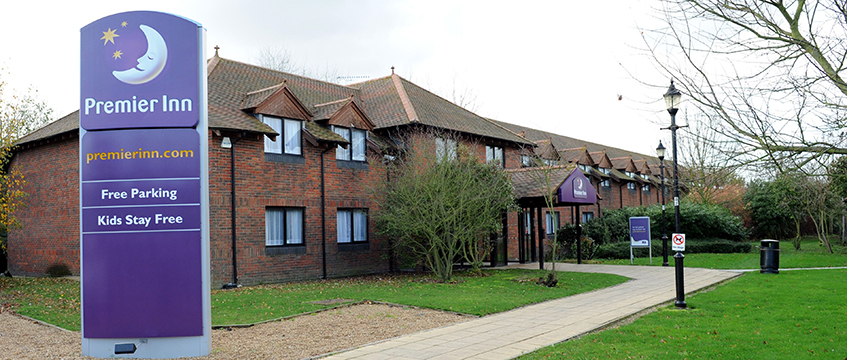Whitbread is considering selling up to £870m of Premier Inn hotels on the back of pressure from activist investor Elliott Advisors to create additional value.
Elliott, the notoriously aggressive hedge fund led by billionaire Paul Singer that also holds stakes in Hammerson, Landsec and British Land, has already forced the company into selling its Costa Coffee arm to Coca-Cola for £3.9bn last month.
However, Whitbread has resisted undertaking a more drastic sale-and-leaseback of its entire portfolio, maintaining that it is not the most sustainable or appropriate structure for the business long-term.
Premier Inn operates 74,508 bedrooms in the UK across almost 800 hotels and 6,430 bedrooms in Germany, which is a major expansion area, across 35 hotels.
Whitbread values the property portfolio of Premier Inn, the only business it now owns, at £4.9bn to £5.8bn based upon a yield of 4.5-5%. In its capital markets day presentation to investors last week, it said that it had identified 10-15% of its portfolio for sale, subject to capital structure and funding considerations.
Opportunistic approach
Whitbread said it had a “specific list of assets with good funding potential” and would take an “opportunistic approach to low-yield transactions”.
Almost two-thirds (63%) of the company’s hotels are held on a freehold basis, although 90% of these are outside London, reflecting the larger amounts of capital required in order to retain freeholds in the capital.
Whitbread is monitoring the yield potential of a further 30-35% (up to £2bn) of the portfolio – mature sites with limited property value creation opportunities that are located on smaller, regional sites.
EG spoke to one major private equity investor that said it had already started taking a deep dive into the company’s portfolio as a result of Elliott’s involvement and the company’s presentation. Over the past two years, there has been a weight of core-plus money that has been raised by fund managers, as well as a series of long-income listed vehicles floated, for which such hotels could be deemed appropriate buying opportunities.
Restraint needed
Will Duffey, executive vice president of hotels and hospitality at JLL, says that there is a decent market for such long-let product but Whitbread should resist pushing out large chunks as portfolios.
“This area has typically been for annuity and pension funds,” he says. “German pension funds such as Commerz Real and Deka have not typically gone for budget, limited-service hotels to date but they are now saying they will. Germans are now being more open to looking at limited-service and doing forward-funding structures than they have been before. A portfolio of around £100m would be most preferred, or even lower.
“The likes of M&G and L&G, which have dominated this space, often already have a large allocation to the covenant. If they came to the market with a £300m or £500m portfolio, I think they might struggle to gain traction.”
The sites that Whitbread said it was considering for sale would be those that had maximised their use potential and that it could be certain to remain in for the next 20 years or more.
Not all of the sites that it looks to sell will be prime and, while the majority of sales will be sale-and-leasebacks, some assets will be disposed of and exited occupationally as well. In particular, these will be smaller, sub-scale hotels where it has a cluster of locations and is looking to consolidate in order to increase operational efficiency. Some 36% of its portfolio is made up of hotels with fewer than 60 rooms (see chart).
The majority of Whitbread’s expansion plans for Premier Inn are in London, and in acquiring these new sites, even on a leasehold basis, it will require swollen coffers that the sale of freeholds could help. In its current financial year, 71% of its openings and committed pipeline have been undertaken on a leasehold basis.
Despite the strong market for its real estate and operational advantages, there are sound reasons that Whitbread has not taken a wholesale approach to property sales.
Cash rich
Having sold Costa, Whitbread is buoyant with cash, and raising funds for expansion through property sales is not necessarily always the most sensible or cost-effective approach. It estimates that such sales incur an ultimate marginal cost of 6-8% compared with short-term debt of less than 2% and long-term debt of 3-4%.
Joseph Quinn, hotels and leisure analyst at Davy, said: “If you start breaking out prop cos and creating new elements, you start creating new layers of structure. These guys are running a quite optimum model that is in the budget area, maximising operations and cutting costs. If you break out the business into different areas, that becomes a lot more challenging.”
A note from Morgan Stanley analysts reporting on the capital markets day also said that Whitbread “did a good job explaining how its… model enables it to maintain end-to-end control of the properties and ensure consistency across the product… The company is flexible regarding property ownership/leasing, but prefers ownership given the security of tenure, asset appreciation, higher margins, ability to churn, control over the product and cheaper funding relative to leasing.”
One sale-and-leaseback veteran said that a prop-co/op-co model would most likely devalue the covenant and negatively impact pricing were it to be undertaken on a larger scale, and notable tax liabilities would also be likely to come into play.
It seems that Whitbread is, at least for now, resisting any pressure from Elliott or Singer to sell an even greater proportion of its portfolio. But given that they are dealing with a man who once attempted to seize an Argentinian battleship off the west coast of Africa in order to force the country to pay back the sovereign debt he had bought, the pressure that may be exerted on Whitbread in the future is difficult to predict.
To send feedback, e-mail david.hatcher@egi.co.uk or tweet @hatcherdavid or @estatesgazette











